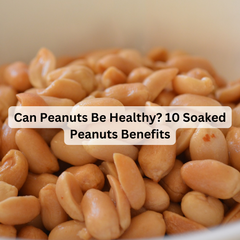When it comes to nutrition, almonds are one of the most nutrient-dense foods you can get your hands on. Eating just one handful of almonds in a day will nourish your body with any essential vitamins, minerals as well as other nutrients. They give you instant energy to keep pushing throughout the day. However, peanuts also hold the title as one of the most versatile and nutritious nuts.
When it comes to protein and vitamin content, most people are not able to choose between these two popular choices. This content will provide a detailed comparison on almonds vs peanuts to help you determine which suits your health goals and dietary needs.
Understanding the Nutritional Value
Although both almonds and peanuts belong to the nuts family, they have distinct origins. Almonds are true tree nuts, whereas peanuts are technically a type of legume. This difference can be noticed in their nutritional profile. Below mentioned is a quick nutritional overview:
Peanut Nutrition (Per 100 grams)
|
Calories |
567 kcal |
|
Protein |
25.8 g |
|
Fat |
49.2 |
|
Carbs |
16.1 g |
|
Fiber |
8.5 g |
|
Key vitamins |
E, B3, B6 and Folate |
|
Key Minerals |
Magnesium, Phosphorus, Potassium |
Almond Nutrition (Per 100 grams)
|
Calories |
579 kcal |
|
Protein |
21.2 g |
|
Fat |
49.9 |
|
Carbs |
21.6 g |
|
Fiber |
12.5 g |
|
Key Vitamins |
E, B2, B7 |
|
Key Minerals |
Calcium, Magnesium, Phosphorus |
If you notice the above nutrition labels, you can see that both of these nuts are calorically dense and loaded with essential nutrients that can have significant health benefits.
Below mentioned are the Nutritional Benefits of Almonds and Peanuts
Proteins
Most of us know that proteins are important for immune health, muscle repair, as well as overall body functions. And, when it comes to proteins, peanuts have a slight edge over almonds. Almond contain 21.2 g of protein, whereas peanuts have 25.8 g of protein per 100 grams. Thus, both peanuts and almonds are considered as an excellent protein source for people who are practicing a vegan or vegetarian diet. The winner here is peanuts as they are relatably inexpensive when compared to protein in almonds.
However, if you are asking the question, do almonds have protein, the answer is yes.
Vitamin E
Vitamin E is considered as a potent antioxidant that shields your cells against oxidative damages. They also support eye and skin health. When it comes to Vitamin E, almonds are a clear winner. It has a whopping 25.6 mg, whereas peanuts have only 8.3 mg per 100 grams. In fact, almonds are considered as one of the best food sources to obtain vitamin E.
So, the next time when you are asking, badam me konsa vitamin hota hai, you have the answer.
B Vitamins
B vitamins are important for brain functions and energy production. They also help with the production of red blood cells in the body. They are also known to reduce the neural tube defects and avoid any type of birth defects. Thus, it is considered as an important vitamin to be obtained. When it comes to vitamin B, peanuts are rich in B3s like folate and niacin, whereas almonds are rich in B2s like biotin and riboflavin. So, both of these nuts are a clear winner to supply vitamin Bs to your body.
Healthy Fats
Both peanuts and almonds are packed with healthy fats, which are important for both heart and brain functions. Almonds contain around 49.9 g of fat, out of which the maximum amount is monounsaturated fats. On the other hand, peanuts contain 49.2 g of fat per 100 gram, out of which the most are polyunsaturated fats. However, this fat can be beneficial for cholesterol regulation in the body.
Fiber
An abundant supply of dietary fiber is important for our body to support digestion, enhance satiety and to control blood sugar levels. When it comes to fiber, almonds excel with an amazing 12.5 grams of fiber per 100 grams. This makes them perfect for weight management and gut health. However, peanuts offer only 8.5 grams of fiber per 100 grams. Almonds are known for their high fiber content and anti-inflammatory properties.
Mineral Composition
Both of these nuts are also rich in their mineral composition. For instance, both of them contain magnesium, an essential mineral for bone health, muscle functions and energy productions. Almonds contain around 270 mg per 100 grams whereas peanuts contain 168 mg per 100 grams.
Another important mineral that you can find in these nuts is calcium. Almonds contain around 269 mg per 100 grams whereas peanuts contain around 92 mg. Almonds are praised for their superior calcium and magnesium content.
Antioxidants
Both of these nuts contain antioxidants. However, almonds take the lead as they have high mounts of vitamin E and phytochemicals. They shield your cells against oxidative stress and lowers the risks of many chronic diseases like cancer and heart diseases. On the other hand, peanuts contain a unique antioxidant called resvertrol, which is usually found in red wine. This antioxidant is praised for its heart protective and anti-aging properties.
Buy Premium Quality Almonds and Peanuts Online
Now that you know the nutritional and health benefits of almonds and peanuts, you can choose the right option that suits your health goals and needs. If you are looking for an option to buy good quality nuts and seeds, Healthy Master could be the best option. You will find a huge selection of premium quality nuts like almonds, Brazil nuts, Pecan nuts, peanuts and many more options to choose from. Apart from the plain varieties, there are also different flavors to choose from.
Conclusion
The choice between almonds and peanuts ultimately depends on your health requirement and dietary preferences. If you are looking for a budget-friendly high protein snack, peanuts could be a great option. Whereas almonds are good for people who prioritise fiber, calcium, Vitamin E, and magnesium.
Both of these nuts are undoubtedly an excellent addition to a balanced diet. However, make sure you are consuming them in moderation. You can also incorporate different types of seeds, berries and legumes in your diet to enjoy varied nutrients. So, it does not matter whether you are choosing almonds or peanuts, it is surely a step towards better health and lifestyle.
FAQs
Which is better, almonds or peanuts?
Both of these nuts are good in their own way. Both contain a good amount of proteins and other essential nutrients which can be highly beneficial for your body.
Do almonds contain more nutrients than peanuts?
Both of these nuts are high in nutrients. However, almonds have a slight edge in certain vitamins and minerals. It is mainly rich in vitamin E, calcium and magnesium. However, peanuts are an excellent source of folate and niacin.
Which nut is better for weight management?
When it comes to weight management, almonds can be more beneficial. The high fiber content and low calorie density in almonds make them great to control appetite while improving digestive health.
Do these nuts contain fats?
Yes, both of these nuts contain healthy fats. However, almonds are rich in monounsaturated fats, which is highly beneficial for heart health. On the other hand, peanuts have a balanced fat profile.
Which nut is good for energy?
Both peanuts and almonds are great energy boosters. They provide instant energy due to their combination of protein, carbs and healthy fats.
 Deal of the week : Trial Snack Box - 18 Wholesome Delights Just at ₹ 899.00
Deal of the week : Trial Snack Box - 18 Wholesome Delights Just at ₹ 899.00





















